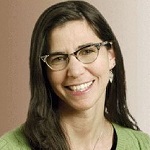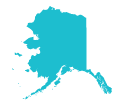 Laurie Wolf, The Foraker Group
Laurie Wolf, The Foraker Group
On the job since: 2015 (joined the organization in 2002)
Organization formed in: 2001
Geographic scope: Alaska
2015 Budget: $4.1 million
Staffing: 18FTE
What are the most important issues facing the nonprofit sector in your state?
The overriding issue facing both our sector and every Alaskan is our state’s fiscal health. Nonprofit organizations, businesses and families in Alaska will be affected by our state’s $4 billion budget deficit. In the wake of the legislature’s decisions this year, we anticipate significant cuts to education, health and human services, arts, culture and the environment. Alaska nonprofits certainly are aware of the problem, but our next steps are far less certain.
What are your core strategies for addressing these issues?
Foraker serves in two main roles:
- A management service organization providing vital capacity building resources through education, training, organizational development, facilitation, and consolidated support services.
- Alaska's state nonprofit association.
Our core strategies for strengthening the nonprofit sector during this challenging economic time are encompassed in both roles. As a capacity-building organization, we are redoubling our efforts to provide tools so organizations can stay focused and think strategically about the difficult decisions they face. As the state association, we are focused on providing the best available data on the sector’s economic impact as a way to enhance our voice “at the table” when important decisions are made about the state’s future.
We also are convening nonprofit board and staff leaders around the state to encourage and help them raise their voices in support of their missions and the sector. Recently we called on legislators “to enact a long-term fiscal plan that is comprehensive, promotes strong rural and urban communities, and protects Alaska’s most vulnerable populations, education and cultural life.” We are offering our assistance to legislators to help them make choices that are good for Alaska communities. This journey has just begun, and we plan additional actions to support the sector as the state addresses this critical challenge.
How can philanthropy best support capacity building for the nonprofit sector in your state? What sorts of investments are most needed?
Capacity building at its essence is about strengthening organizations and the sector to do the best they can to serve communities. When philanthropy is interested in investing in capacity building, it is best to do it with an eye on how organizations will benefit and grow from the knowledge they gain. It might be easy to fund a planning session or a set of strategies, but asking the questions up front about how the organization will focus on what it learns and then incorporate that into daily work is a good test to know if the investment is worth it. In concrete terms our sector can benefit from more investments in creating cultures where individual philanthropy can flourish, where collaboration rather than competition is the norm, and where the use of financial and mission data is expected as a part of productive decision-making.
What’s been a recent big success for your organization and what excites you about it?
In July 2015, Foraker completed a succession plan for Dennis McMillian, our founding president and CEO. After participating in a nationwide search, the board selected me to become the next CEO. I’m pleased to report that this deliberate process, paired with board focus on Foraker’s values, has helped create a smooth transition. Dennis is still part of Foraker, providing facilitation and other services to nonprofits. We’ve brought in additional staff, and the Foraker boards have remained strong and involved throughout the process. We know from experience working with nonprofits over the last 15 years that leadership transition can be a challenging time in any organization. Our team has watched and learned, and I am thrilled to say that we came out the other side just as strong as we went into the process.
Our other big success is stepping up our public policy work. Once again, through a deliberate process guided by our boards, we have increased our visibility on important issues affecting the sector. This has allowed us to position ourselves with authority and credibility as the voice of the sector during this critical time in Alaska’s history.
What are the most important public policy issues for you this year, and what are you doing about them?
Our board has adopted six public policy priorities, including assessing gender pay equity in our sector. To date, no research has provided useful data on this subject. Foraker has conducted salary and benefits surveys for the sector for many years, and 2016 is the first year we will be determining if and how much disparity exists in gender pay in Alaska’s nonprofit sector.
What are the one or two best opportunities you see for nonprofits and philanthropy to “go beyond the grant” to work together to create sustainable change in communities?
In Alaska, we already have some excellent examples of philanthropy and the sector moving “beyond the grant.” Examples include the work by the Mat-Su Health Foundation on collecting data and supporting initiatives to address behavioral health issues, or the pursuit by more than 50 stakeholders including private, philanthropic, nonprofit and government entities to expand Medicaid in Alaska. Foraker’s own Sultana LLC is incubating a new program called “Recover Alaska” that is focused on strategies to reduce harm caused by excessive consumption of alcohol in Alaska through changes in systems, policies, and practices.
We can also see these examples in the arts with a partnership that includes EmcArts, Rasmuson Foundation and Foraker to bring an arts innovation program into the state. Education has its own leaders in thinking “beyond the grant.” Alaska Native educational foundations are among the fastest growing funders in our state and do far more than provide scholarships and cultural grants to their shareholders. Their commitment to engaging with individual Alaskans and nonprofits is inspiring. Is there more that can be done to tackle our big issues – absolutely. But as these examples show, in Alaska we’re relying on strong values and partnerships to improve our communities and the quality of life in “the great land.”
What’s one more question we should ask you, and how would you answer it?
Q. What has been the primary “guiding light” for Foraker as you work to strengthen Alaska nonprofits?
A. Anyone who knows me or anyone at Foraker has heard this answer before: our sustainability model. For a number of years now, we have closely examined what a set of lenses looks like to make critical decisions. Ultimately we articulated four factors: focus, right board and staff, partnership, and unrestricted funds. As we refined our thinking about sustainability for the sector we also learned how it applies to ourselves. In that effort we developed our theory of change, and a dashboard that tracks our progress. All three are tightly integrated – and they’re clearly understood and embraced by board and staff. It’s the way we develop strategies and make decisions. In fact, we are in the process of creating our new five-year strategic plan, and we’ll be adhering closely to the outer circles of our theory of change. For example, up to now our focus on public policy has been on using our own voice to speak for the sector. Now, we will work on amplifying the capacity of other organizations to speak for their mission. Ultimately, we believe that the journey of sustainability includes nonprofits with strong and clear voices that will support healthy communities.
We send thanks to the M.J. Murdock Charitable Trust, and especially Kit Gillem, who have both supported and informed our work on the sustainability model and theory of change.
Laurie Wolf is president and CEO of The Foraker Group, joining us this month for our virtual roundtable with state nonprofit association leaders.